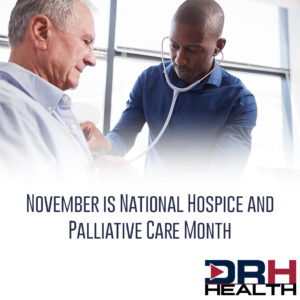November is Hospice and Palliative Care Month
November is National Hospice and Palliative Care Month, and hospices across the country are reaching out to raise awareness about the highest quality care for all people coping with a life-limiting illness. It is reported that every year in the United States, nearly 1.4 million people who are living with a life-limiting illness receive hospice care. 
Hospice care combines medical care with the emotional and spiritual support that families need most when facing a serious or terminal illness. Hospice professionals work to manage any end-of-life disease symptoms while allowing the patient to spend their remaining time where they would like, i.e., at their home. Hospice care also assists caregivers and families with support and education. Counseling and bereavement services are also available to help support caregivers and family members (including children) with their loved one’s impending death.
Talking about hospice care and making the decision to seek hospice care can be challenging. It is a difficult conversation to have. But the benefits, care, and support hospice can provide makes it worth the discussion. A few suggestions to start the conversation:
- Going on hospice doesn’t mean you are giving up.
Many people believe going on hospice care means you are waiting for the end. Hospice is just another form of care that focuses on reducing pain and discomfort while improving life quality.
- Having an initial conversation is very important.
Starting the hospice conversation is another way of exploring treatment options that are best for your loved one’s medical situation.
- Determine the individual needs
For someone living with a chronic condition, they may be at different stages regarding the care they want. Some may want to continue to pursue a cure, while others are not interested in that avenue. It is essential to know your loved one’s wishes regarding the next step in their care before an informed decision can be made.
- Ask the right questions.
Hospice care is a discussion no one wants to have, as talking about death is difficult. But if you can openly approach the conversation, you may be surprised at how comfortable loved ones can be regarding the topic.
Understand that hospice care is personalized care that brings dignity and compassion when they are most needed.
Kim Davis, APRN-CNP
Ringling Family Care
